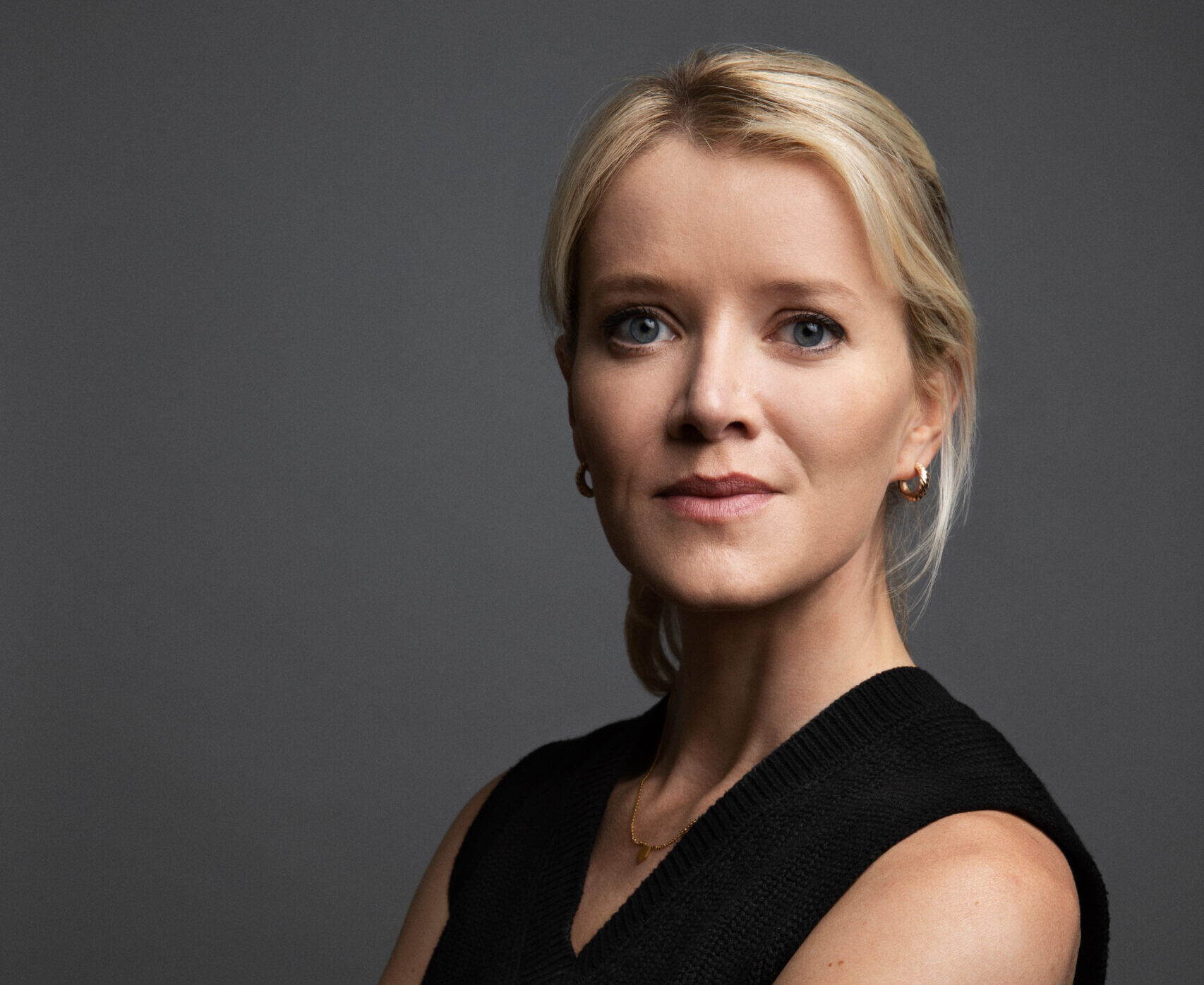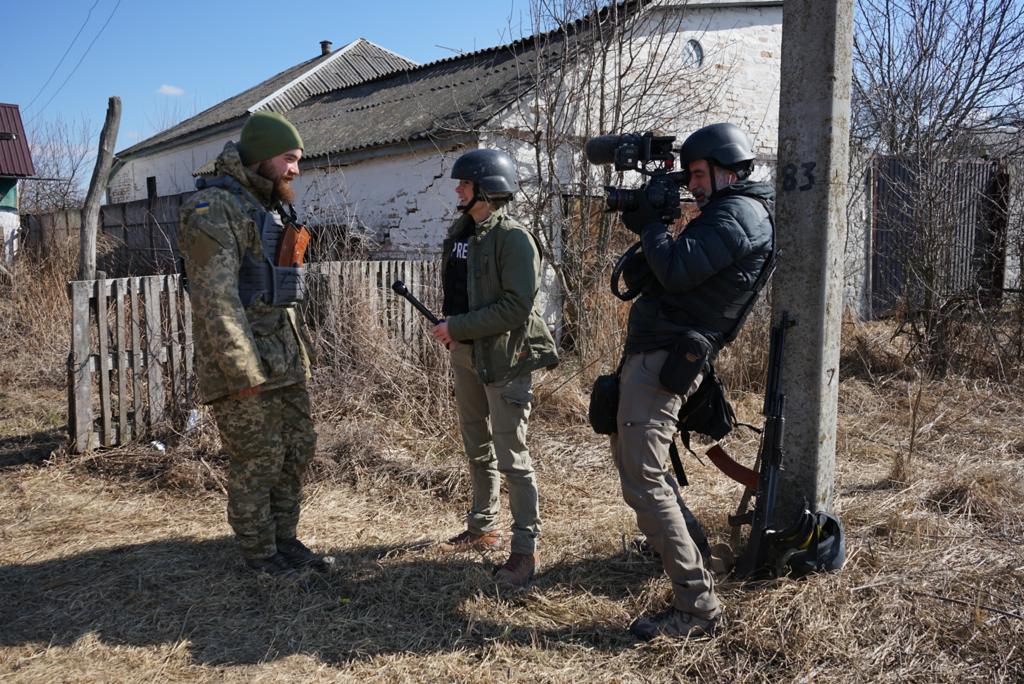PBS Correspondent Jane Ferguson on Why Russia’s War in Ukraine Has Been So Dangerous For Journalists

Photo by Allison Michael Orenstein
Jane Ferguson had a terrifying first 36 hours in Kyiv.
Two weeks ago, the experienced foreign correspondent arrived in the Ukrainian capital. She planned a reporting trip to Irpin, a suburb northwest of Kyiv that has seen intense fighting.
Ferguson, a special correspondent for PBS NewsHour and contributor to the New Yorker, had unfortunate timing. The day she and her crew arrived was a bloody one for the press in Ukraine, which is reporting on a Russian invasion that, in less than a month, has killed at least five journalists and wounded more.
Brent Renaud, a documentary filmmaker who was in Ukraine on assignment for Time, was killed by Russian forces in Irpin the day Ferguson arrived. The next day, Russian forces attacked a Fox News crew near Kyiv, wounding correspondent Benjamin Hall, and killing cameraman Pierre Zakrzewski and the network’s fixer, local journalist Oleksandra Kuvshynova.
“That’s an unbelievable toll,” Ferguson told me on this week’s episode of The Interview.
As Ferguson and her crew made their way to Irpin, they were stopped by Ukrainian forces at a checkpoint just outside Kyiv. The soldiers told said they couldn’t pass.
“And of course, we naturally start arguing,” she recalled, “and then they pointed to a body in the grass next to us and said, ‘That’s a dead journalist.'”
“It was Brent Renaud’s body, under a blanket, sat right there next to us,” Ferguson said. “And that was unbelievably sobering and tragic to see.”
The next morning, Ferguson was driving around with her crew as her cameraman filmed out of the window of their car.
“We know not to film, obviously, the checkpoints, but there wasn’t a checkpoint,” she said. “Instead, there happened to be a military facility to the left that was unmarked.”
“A gunman jumped out and surrounded our car in a way that was highly professional, highly charged and extraordinarily tense,” she continued. “For a second I was absolutely certain they’d shoot us.”
“Instead, they surrounded the car, pulled us out of the car at gunpoint. I mean, guns were pointed at us. Made us put our hands on the bonnet and roof of the car and held us there. They tried to take my cameraman away, but I made a big fuss and wouldn’t let them do that. But it was unbelievably tense. Those were Ukrainian forces, and many journalists I’ve talked to have had that experience.”
“That was my first 36 hours in this city,” she said.

Jane Ferguson and cameraman Eric O’Connor interview Arthur, a Ukrainian solder. Photo via PBS.
Ukraine is just the latest bloody conflict Ferguson has traveled to report on. She has covered the rise of ISIS in Iraq, snuck into Houthi-controlled Yemen disguised as a local to cover the famine caused by the civil war, and reported on the frantic evacuation from Afghanistan after the U.S. withdrawal.
But the pace of violence against journalists in Ukraine, Ferguson said, “has been unbelievably shocking.”
“It’s an incredibly dangerous place to work,” she said. “I think one of the most difficult things that journalists have been grappling with after hearing the news of every death is how do we possibly avoid that? Because very often these journalists are not doing something that the rest of us aren’t. They’re not pushing the envelope, going to incredibly dangerous places.”
The fact that the frontline in Ukraine remains so fluid, Ferguson said, makes calculating risk incredibly difficult.
“The problem here is that you could be just driving down the road that you’ve driven down 50 times and suddenly there’s gunfire, and no one will quite be able to explain to you where it comes from and who they are,” she said.
Ferguson explained that Ukraine is simply a different kind of war than the one she and other foreign correspondents have been covering since 2001.
“The last 20 years we’ve been covering post-911 wars,” she said. “We’ve been covering insurgencies. We’re either with the insurgents, embedded with them, or we’re more with the government forces. Here you’ve got two conventional armies fighting each other with heavy artillery fire, rockets, airstrikes. That means frontlines are extremely fluid and extremely deadly and indiscriminate. And that has been, I think, one of the biggest challenges of the last few weeks for journalists.”
Ferguson was born and raised in Northern Ireland. After graduating college during the 2008 financial crisis (not a bountiful time for jobs in journalism) she decided to travel to Yemen to learn Arabic. She would eventually work for Al Jazeera and CNN as a freelance reporter before joining PBS, winning Polk, Emmy, and DuPont awards along the way.
Download the full episode here, and subscribe to The Interview on Apple Podcasts or Spotify. Read more coverage of The Interview on Mediaite.